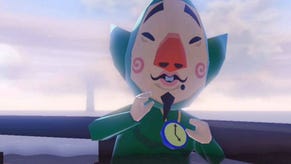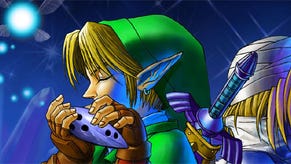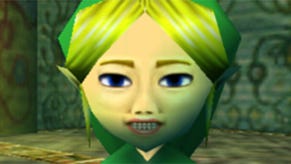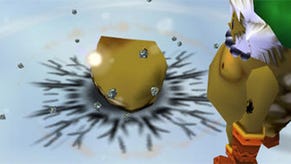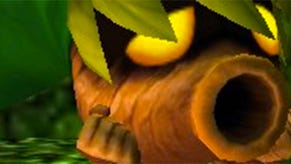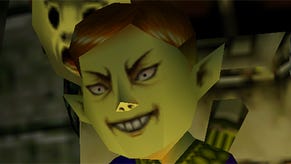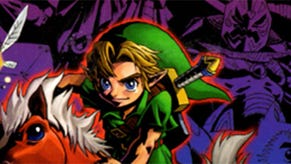The Legend of Zelda Majora's Mask 3D Review: Rewind to a More Daring Time
Nintendo looks to the past for an opportunity to perfect the cult favorite sequel to Ocarina of Time.
This article first appeared on USgamer, a partner publication of VG247. Some content, such as this article, has been migrated to VG247 for posterity after USgamer's closure - but it has not been edited or further vetted by the VG247 team.
Something about the very existence of an enhanced remake of The Legend of Zelda: Majora's Mask feels pleasantly appropriate. Remakes are nothing new in this day and age, but here's a game whose core mechanic consists of rewinding time to repeat actions, refining and perfecting them with each iteration. Now, here's a game whose creators have rewound time in order to refine and perfect their work.
And Majora's Mask seems particularly well-suited to the 3DS format — not only because its relatively low-spec capabilities make the dated visuals of what began life as an N64 game less out-of-place, but also because the portable Zelda games have always been the outliers in the series.
Console Zelda adventures almost always attempt to advance the series, the genre, the state of the art; portable Zeldas go off the rails (or in the case of 2012's Spirit Tracks, very much on the rails) and off the beaten path. They're where Nintendo stretches its creative muscles and tries things that might be too risky for a big-budget console title with big expectations attached.
Majora's Mask always felt like an oddity, the wrong game on the wrong platform, more at home with "weird" Zelda experiments like Link's Awakening or the dual-linked Oracles titles. Heck, the rewind-and-repeat concept even found an echo in the Palace of the Ocean King from Phantom Hourglass for DS. Majora's Mask 3D feels less like a much-demanded conversion and more of a cosmic inevitability.

I can't imagine better circumstances for Majora's Mask to go portable. It's shipping alongside the New 3DS, a system whose enhancements over the standard 3DS model would ostensibly make this conversion even more palatable. In practice, though, the upgrade isn't really essential; this version of Majora's Mask doesn't benefit from the upgrade nearly as much as the original did from the N64's RAM expansion pak. Sure, the N3DS's head-tracking makes the 3D effects much more appealing, but that's merely cosmetic, and universal to all 3DS games. And the new C-stick doesn't help nearly as much for camera control as you might expect. Ultimately, Majora's Mask is a game designed around the camera mechanics of 2000, and 95% of the time all you really need is the left trigger to recenter the camera.
It's a shame Majora's Mask 3D developers Grezzo didn't go all-in on improvements to the game, because the camera is only one area in which MM3D feels very much like a product of an older time. Lock-on targeting, once Zelda's grand advantage over its action/adventure competitors, has grown cumbersome and awkward by comparison to more recent refinements other developers have applied to the concept. Even Grand Theft Auto has a better camera system than this these days, if that tells you anything.
More than that, though, the adventure actually feels remarkably by-the-books. This has been my first playthrough of Majora's Mask, and its tidy orthodoxy has come as something of a surprise. For all that its reputation places it as a black sheep of the Zelda franchise — not without some justification — beyond its central rewind mechanic, surreal atmosphere, and emphasis on donning masks to change Link's skills and even his basic nature, Majora's Mask is still very much a Zelda game. You're still conquering dungeons by using your most recent tool and mask acquisitions against the boss in the big room at the end, whose glaring weak point must be exposed repeatedly so that you can pound on it with your sword. You're still rescuing princesses and helping faeries and hanging out with Gorons in order to complete essential side quests. Majora's Mask can be weird, yes, but it still feels very much like a game cut from Ocarina of Time's fabric, and not only on a visual level.

This is, to be sure, a strength: An adventure molded in the image of one of the most revolutionary games of all time is hardly anything to sneer at. If Majora's Mask feels a bit predictable in its moment-to-moment tasks, that's less on the original game than on all the imitators that have followed in the ensuing years without offering revolutionary leaps ahead in game design. And anyway, the bigger picture that binds the familiar quests and dungeon scenarios together here still sets Majora's Mask apart not only from other Zelda adventure but from other games as well.
If anything, the need to rewind and repeat your tasks makes this 2000-vintage adventure feel remarkably contemporary in 2015. Majora's Mask sees the land of Termina under the imminent threat of catastrophe, giving you three days of in-game time (or slightly more than an hour of real time) to complete your adventure before the plummeting moon annihilates the land and you're forced to rewind time three days. When you leap backward, most of your progress resets along with the game world; only Link himself remains untouched, along with his key tools. You keep your combat techniques, your masks, your main weapons, and the songs you've learned on the Ocarina of Time, but everything else reverts to the way it was at the beginning of the game.
At the time of the game's initial release, the popular comparison among players and reviewers was to the Bill Murray film Groundhog Day. And, sure, the connection certainly exists. But really, this recursive loop is much more a creation of video games than of film or fiction; consider last year's sci-fi hit Edge of Tomorrow, a movie based on a book inspired by video games. Or more to the point, look to the recent explosion in popularity of games that draw on the roguelike genre for guidance, forever challenging players to do their best and sending them back to their initial state as punishment for failure.

Many of the biggest indie hits of the past couple of years owe their existence to the roguelike: F.T.L., Spelunky, Rogue Legacy, The Binding of Isaac, and many others. Isaac, in fact, really works as a spiritual cousin to Majora's Mask, adapting the 8-bit Legend of Zelda into a hybrid of roguelike and twin-stick shooter. If Majora's Mask felt too outlandish and daunting in its unforgiving design 15 years ago, today it feels more like a patron saint of indie games.
Of course, this game is its own creature as well, playing by different rules than a true roguelike. The game-resetting fail state here comes not from falling in battle but rather from running out of time. And it's not a "true" roguelike, because protagonist Link retains certain traits and acquisitions every time he resets the clock rather than zeroing back out to starter level. Instead, it works as a sort of synthesis, using the concept of a deadline to add tension to the experience.
For many players, this is where Majora's Mask goes wrong. It's a game that dares to make demands of its audience, forcing them to play with skill, to learn the routines of characters and the layout of dungeons. It requires planning, consideration, and discipline, traits largely unneeded in most modern blockbuster games. Nintendo willingly sidetracked this adventure into in a niche — and those who can see those niche traits as a source of inspiration rather than of frustration, they did so quite expertly. This version goes the extra mile to reduce the trial-and-error and frustration of the numerous quests you need to contend with, presenting a great deal of information transparently without ever feeling like it's holding your hand... a pleasant change from contemporary Zelda.

Yes, Majora's Mask can be infuriating when you're forced to rewind midway through fighting the boss at the end of a dungeon, or when you've found all but one of some sort of collectible that will reset along with the world. Screwing up a tricky puzzle and wasting hours of in-game time can be terribly discouraging. But at the same time, when you work out the optimal sequence of events that will let you achieve some distant goal within your allotted time, the game can be downright euphoric. When you complete a time-intensive task with a mere minute of in-game left until lunar impact — literally at the last possible second — and reset time at 5:59 a.m. on the final day, Majora's Mask creates a sense of triumph far greater than any Zelda title has inspired in years.
In other words, Majora's Mask 3D asks much, but so too does it give equally. Its world is filled with memorable people whose lives you aspire to protect from the looming apocalypse. Its dungeons transcend typical Zelda puzzle environments by adding a sense of urgency to the proceedings. Its masks create far greater variety of play and much greater strategic richness to the adventure than perhaps any other entry of the franchise has ever seen. Majora's Mask demands commitment, and players who yield to its expectations will find a familiar experience wrapped in the trappings of something far more esoteric. And if you've already played Majora's Mask, well, this remake will allow you to play it the way it seems like it was always meant to be played.
VisualsDated, but the small screen, great design work, and some contemporary graphical tricks like bloom lighting help compensate.
SoundGreat at supporting both gameplay and mood, Majora's Mask 3D's audio does the trick.
InterfaceAs with Ocarina of Time 3D, Grezzo has gone the extra mile to make Majora's Mask more playable, offering a huge suite of control options and breaking out key menus and tools to the touch screen for easy access.
Lasting AppealAs substantial as any other Zelda adventure, but with deeper and more esoteric secrets, Majora's Mask 3D will keep players engrossed for
ConclusionMajora's Mask remains one of the most daring sequels ever. Who would follow up a blockbuster, medium-defining hit by wrapping the familiar in such strange and unearthly trappings these days? Majora's Mask 3D feels at home among today's indie games, but it also serves as a reminder that there used to be room for the offbeat at all levels of the games industry. And with the tweaks and improvements this version enjoys over the original release, it remains quite playable despite its age.

